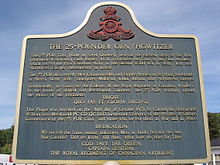Ubique (poem)

"Ubique" is a poem by Rudyard Kipling about the Boer War, published in The Five Nations in 1903.[1]
Its title is derived from the Motto and Battle Honour of the Royal Regiment of Artillery, however the opening lines are attributed to the lack of knowledge of Latin within the ordinary ranks of the Gunners. Ubique is pronounced "Ooh-Bee-Kway", but is generally pronounced as "You-Bee-Kway".
T. S. Eliot included the poem in his 1941 collection A Choice of Kipling's Verse.
Meaning
Ubique ("everywhere" in Latin) is the motto of the Royal Artillery[2] and the Royal Engineers.[3] It was given to them by King William IV in 1832 and in 1833 it was further granted as a battle honour to the Royal Artillery in place of all former and later battle honours they could receive.
References
- ^ The Five Nations, The University of Newcastle, Australia
- ^ "The Verse of Rudyard Kipling, Major General's Page". Zeitcom.com. Archived from the original on 2012-12-20. Retrieved 2013-05-02.
- ^ Royal Engineers
External links
 Works related to Ubique at Wikisource
Works related to Ubique at Wikisource
